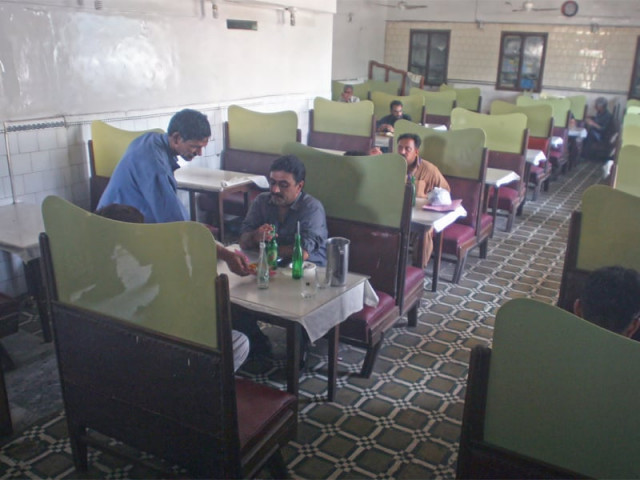If these walls could talk: Once abuzz with politics, Iranian cafes feel edged out
Many eateries around the city have now completely changed their look to modern cafes.

Cafe Muzammil, near Sindh Secretariat, continued to facilitate intellectuals even when General Ziaul Haq draconian laws imposed a ban on political gatherings. PHOTO: ATHAR KHAN/EXPRESS
“Young revolutionaries, journalists, novelists, poets, columnists and politicians would spend long hours over a single cup of tea,” said Abass Ramzani, the owner of the Khairabad tea shop. With a tinge of Persian accent, Ramzani recalled that his grandfather had opened the restaurant in 1936. “This tea shop witnessed the partition of the sub-continent and the ideas which led to the birth of Pakistan. “The prominent debating circle would often include students from the hostels who would involve themselves in politics and poetry - today, these students are known as the seasoned politicians of the country, such as Qaim Ali Shah and Syed Ghous Ali Shah.” The Khairabad tea shop has managed to survive due to its thriving location on the eastern end of the II Chundrigar Road - a hub of printing and newspaper offices. Journalists, columnists and other literati still come over and spend their evenings at the tea shop. Other Persian eateries have not been so lucky. “Now only five to six authentic Persian restaurants exist in Karachi as most of the owners have shifted from traditional Iranian eateries to more commercial cafes,” shared Ramzani.
Authenticity loses out to commercialism
Pehlvi Restaurant on MA Jinnah Road was named after the Shah of Iran, Mohammad Reza Shah Pahlavi and bore resemblance to a traditional Persian hotel with wooden furniture and authentic food. But five years ago, it accepted defeat in the face of commercialism and ‘modernised’ the look to match those cafes which can be found in abundance all over the city.

Cafe Muzammil, near Sindh Secretariat, continued to facilitate intellectuals even when General Ziaul Haq draconian laws imposed a ban on political gatherings. PHOTO: ATHAR KHAN/EXPRESS
Cafe Liberty located at Tariq Road, which was one of the most famous and busy hangouts in the city, has also become a faded memory. The café which was known to serve some of the best Pakistani and Persian food has now become a showroom of garments.
“These were the places where Josh Malihabadi, Faiz Ahmed Faiz and Ibn-e-Insha used to gather and we as young men would try to soak in as much as we could from them,” said the Karachi Arts Council President Ahmed Shah while talking to The Express Tribune.
“The youth was politicised through these gathering at the Persian and Malabari hotels around the city,” he added while recalling Cafe Al-Hassan in Block 1 of Nazimabad. “We used to sit there till Fajr but due to the unpredictable law and order these days, we try to go home as soon as possible.”

Urdu poet and scholar Prof. Sehar Ansari while talking to The Express Tribune shared his memories of Raees Amrohi, Jaun Elia, Ali Mukhtar Rizvi, Meraj Muhammad Khan and Fatehyab Ali Khan who used to spend time at these cafes. He named Cafe George, William Coffee House and Cafe A-one among the busiest eateries.
“We used to sit in these cafes for at least five hours with one cup of tea and the owners, who were also educated people, were always welcoming,” said Ansari. “We were privileged to have acquired wisdom from the literati at these cafes but the youth today, unfortunately, have been deprived of the same opportunity.”
Published in The Express Tribune, May 27th, 2013.


















COMMENTS
Comments are moderated and generally will be posted if they are on-topic and not abusive.
For more information, please see our Comments FAQ